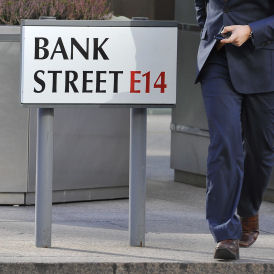Banking report: ringfence retail to protect taxpayer
A report in the wake of the financial crisis suggests banks ringfence their retail arms and puts pressure on Lloyds to sell more branches. But it’s no banking revolution, Faisal Islam says.

The Independent Commission on Banking (ICB) report, which will be followed by final recommendations in September, is part of the process of reforming the banking industry in the UK in the wake of the financial crisis. It also aims to protect taxpayers against future bank bail-outs.
The report suggests that banks should ringfence their retail operations, but does not call for them to be operated entirely separately from the riskier investment banking arms, as could have been the case. Banks should instead carry out their retail services through a separate subsidiary, it said.
It also called for Lloyds Banking Group to sell more of its branches to improve competition, although it stopped short of calling for the “rescue” takeover of HBOS to be reviewed or even reversed.
Banking revolution?
"These are far-reaching, transformative and a landmark" proposals, announced Sir John Vickers in launching this interim report on the future of our banking system, writes Channel 4 News Economics Editor Faisal Islam.
My sense is right now that is something of an overstatement. Almost all will be decided in the devilish detail of what gets ringfenced, how strong are rules on subsidiaries etc. The history of bank capture of regulatory and political authorities in Britain (and around the world - see Simon Johnson's 13 Bankers) leaves me sceptical that this will end up being transformative.
Read more on Faisal Islam's blog on the banking report: is it a game-changer?
Risks
The report also criticised the “excessive and ill-understood risks” taken by lenders and borrowers in the run-up to the credit crunch – adding that the safety net of taxpayer support encouraged risk-taking. In future, it recommends that creditors rather than taxpayers ought to be liable for losses.
The ICB, set up last June to review UK banks and led by Sir John Vickers, also suggested that banks needed to hold more cash to protect against future economic shocks.
Read more in the Channel 4 News Special Report on the economy
Bank shares rose on the back of the report. Barclays and part-nationalised Royal Bank of Scotland leapt 4 per cent and 3 per cent higher respectively. Lloyds, which is 41 per cent owned by the taxpayer, rose nearly 2 per cent.
Bank analyst Bruce Packard, at Seymour Pierce, said he expects banks to be “secretly pleased” at the proposals.
Chancellor George Osborne welcomed the report, saying: “This Coalition Government set up the Independent Commission on Banking to ask the difficult questions that weren’t asked before the crisis and that is exactly what they have done.”
‘Big mistake’
As the report was published, former Prime Minister Gordon Brown admitted in a speech in America that he had made a “big mistake” on financial regulation ahead of the economic crisis.
He said that neither he, nor any regulator, had realised how entangled or global the banking system was.
“So we created a monitoring system which was looking at individual institutions. That was the big mistake,” he told an event organised by the Institute for New Economic Thinking in Bretton Woods, New Hampshire over the weekend.
“I have got to accept my responsibility and I do, and I have been very open about saying we made mistakes on that. But in a world where the understanding of what global meant was incomplete, I think many writers as well as many regulators made exactly the same mistake.”
Watch Gordon Brown on the “mistakes” he made ahead of the economic crisis below.